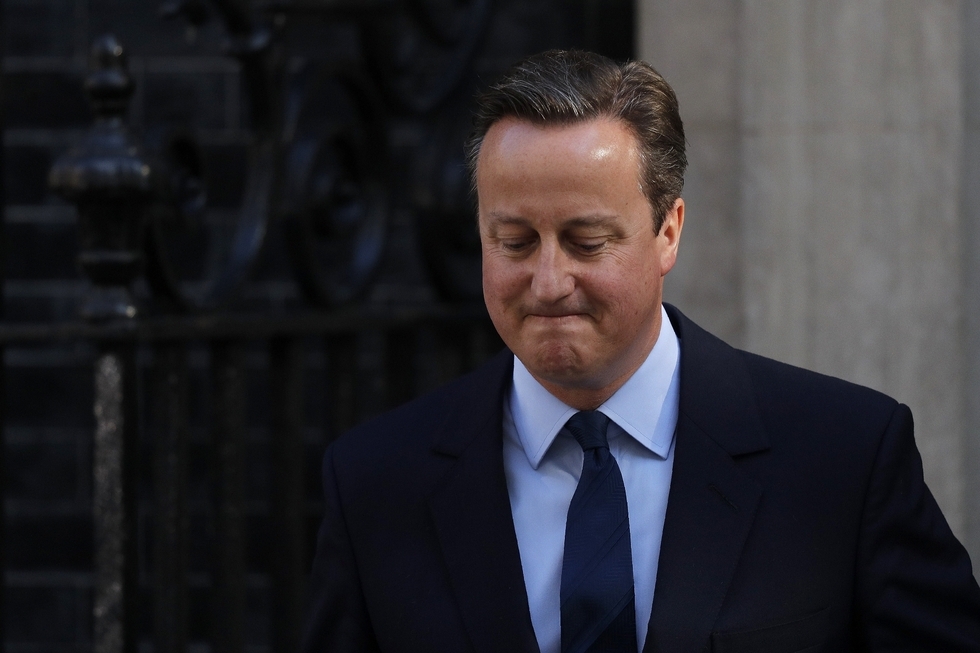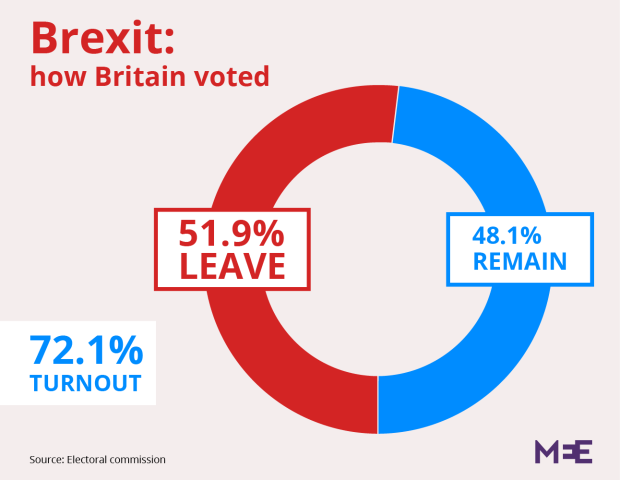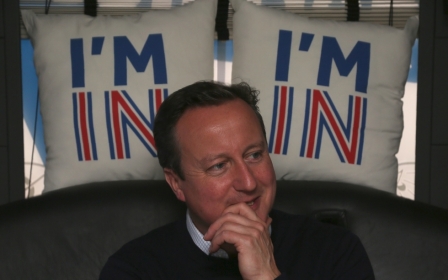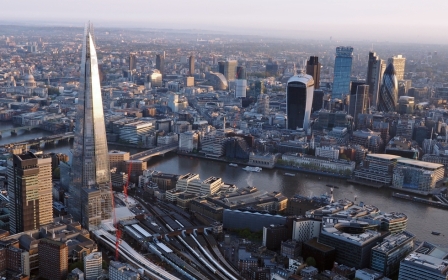Brexit bombshell plunges UK into chaos as EU leaders battle contagion

Britain's prime minister announced he was quitting, the head of the opposition faces a challenge to his leadership, and employers and financial institutions warned of an economic crisis after the British public voted to leave the European Union after 43 years of membership.
David Cameron announced on Friday that he would stand down by October, hours after results showed 52 percent of the public had voted in defiance of his predictions of economic disaster and isolation.
Sterling plunged to a 31-year low and markets around the globe went into a tailspin as business reacted to a historic decision, which UK Independence Party leader Nigel Farage described as Britain's "independence day".
Standing outside 10 Downing Street, Cameron said: "The British people have voted to leave the European Union and their will must be respected.
"I fought this campaign in the only way I know how which is to say directly and passionately what I think and feel – head, heart and soul.
"I held nothing back. I was absolutely clear about my belief that Britain was better and safer inside the EU."
After the result, however, Cameron said: "I do not think it would be right for me to try to be the captain who steers our country to our next destination."
Cameron, whose voice choked as he concluded, said he would leave it to the next prime minister to trigger Article 50 of the Lisbon treaty, which represents formal notification of the UK's decision to leave.
He will leave his job before his Conservative Party holds its annual conference in October, he said.
But pressure was already mounting for immediate action, as a stunned EU urged Britain to leave as "soon as possible" amid fears of a chain reaction of further referendums.
In a sign that the bloc wants to move on swiftly, EU chiefs told Britain in a strongly-worded joint statement to "give effect to this decision of the British people as soon as possible, however painful that process may be".
The statement was signed by Donald Tusk, the European Council president, Martin Schulz, the European Parliament's president, Mark Rutte, the president of the Council of the EU, and Jean-Claude Juncker, the president of the European Commission.
Juncker separately said he was "very sad" that Britain had voted to leave but repeated that there would be "no renegotiation" of Britain's membership.
German Chancellor Angela Merkel said she would host Tusk, French President Francois Hollande and Matteo Renzi, the Italian prime minister, in Berlin on Monday to chart a reform plan.
The referendum split the United Kingdom in half. Leave was strongly supported in Wales, the northeast of England and the Midlands, while London, Scotland and Northern Ireland voted overwhelmingly to remain.
It has also prompted a motion, put forward by Labour MPs Margaret Hodge and Ann Coffey, for a vote of no confidence in party leader Jeremy Corbyn.
Under the motion, Corbyn's leadership will be discussed at the party's next meeting on Monday and could be followed by a secret ballot as soon as the following day.
Around the world, investors scrambled to sell the pound, oil and stocks as Britain took a lurch into the unknown, becoming the first country to quit in the near 60-year history of the EU and its predecessor, the European Economic Community, a culmination of decades of suspicion over European aims of creating an ever-closer political union.
Mark Carney, the governor of the Bank of England, sought to reassure the world's traders in a statement shortly after Cameron's, saying that he would make £250bn extra available to steady banks as needed.
Farage heralded the results as a "victory for real people".
"Let 23 June go down in our history as our independence day," said Farage, who had promised the British people the chance to retake power from Brussels and rein in high immigration.
"If the predictions now are right, this will be a victory for real people, a victory for ordinary people, a victory for decent people," he told supporters.
A joyous crowd chanted back to him: "Out! Out! Out!"
The shock of Brexit hit stock markets hard, with London's FTSE 100 index recovering from early losses to close down 2.8 percent.
The Frankfurt stock exchange suffered a 6.2 percent loss, while Paris slumped 8.0 percent, with Milan losing 12.5 percent and Madrid 12.4 percent.
Sterling reached its lowest valuation against the dollar in 31 years, falling eight percent before rallying later in the day.
Going it alone
The result means the world's fifth-largest economy must now go it alone in the global economy, launch lengthy exit negotiations with the EU and broker new deals with all the countries it now trades with under the bloc's umbrella.
Juncker warned that the EU will "not be bending over backwards" to help Britain in those negotiations.
Bilateral immigration treaties between Britain and France would however not be affected by the vote, the French government said.
Those treaties include a 2003 agreement that allows British officials to check passports on French soil and vice versa, effectively putting the border with Britain on French soil, and leading to migrants trying to reach British shores congregating in camps at Calais, including the notorious "Jungle".
Analysts say it could take the island nation a decade to secure new trade accords worldwide.
In a worst-case scenario, the International Monetary Fund has warned that the British economy could sink into recession next year and overall economic output would be 5.6 percent lower than otherwise forecast by 2019, with unemployment rising back above six percent.
Thousands of jobs in the City could be transferred to Frankfurt or Paris, top companies have warned.
The Brexit camp argued that the business world will adapt quickly, however, with Britain's flexible and dynamic economy buoyed by new economic partners and selective immigration.
The campaign has left Britain riven in two, marked by the brutal murder of pro-"Remain" MP Jo Cox, a mother of two who was stabbed, shot and left bleeding to death on the pavement a week ahead of the vote.
The vote also threatens the unity of the United Kingdom.
Two years after Scotland voted in a referendum to remain in the United Kingdom, its political leader, First Minister Nicola Sturgeon, has said a new independence vote is "definitely on the table" after Britain voted against the majority will expressed by Scots.
"Scotland sees its future as part of the EU," Sturgeon told Sky News after the vote.
Northern Ireland, which is part of the UK, is now faced with the prospect of customs barriers for trade with EU-member the Republic of Ireland. Irish republican group Sinn Fein called for a vote on Irish unity following the referendum.
Messages from the Middle East
What little reaction came from countries in the Middle East included taunts from Iran and Turkey over the UK's past and claims of an end to the EU.
Massoud Jazayeri, a senior commander in Iran's Revolutionary Guard, described Britain's decision as payback for "years of colonialism and crimes against humanity".
An official in President Hassan Rouhani's office, Hamid Aboutalebi, called the vote a "big earthquake" that would be part of the "domino" collapse of the EU.
Turkey's deputy prime minister, Nurettin Canikli, also said it was the beginning of the end for the EU.
"The period of the disintegration of the European Union has begun. And the first vessel to have departed is Britain," he said.
Turkey has been trying to gain membership of the EU for decades.
Middle East Eye propose une couverture et une analyse indépendantes et incomparables du Moyen-Orient, de l’Afrique du Nord et d’autres régions du monde. Pour en savoir plus sur la reprise de ce contenu et les frais qui s’appliquent, veuillez remplir ce formulaire [en anglais]. Pour en savoir plus sur MEE, cliquez ici [en anglais].





